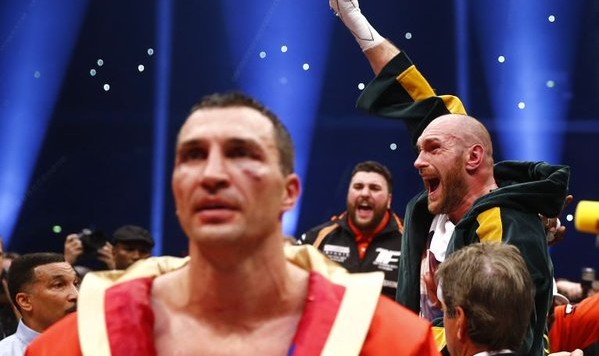Ladies and gentlemen, we have a new heavyweight champion. And he’s an absolute maniac.
Tyson Fury took Wladimir Klitschko’s crown Saturday, and while it wasn’t a stellar performance in the ring, as long as Fury reigns it will be a very different administration. Klitschko was a gentleman, an owner of a PhD and does work for the United Nations on the side. Fury rides the line between “lovable oddball” and “person who might actually be insane.”
As if to illustrate how jarring this transition will be, Fury commandeered the broadcast after the post-fight interview — he just took the microphone away — and proceeded to sing Aerosmith’s “I Don’t Want To Miss A Thing” to his woman, and, by virtue of having the microphone, the crowd in Germany and those of us watching on HBO.
If it seems like this is out of the usual order of a post-fight write-up, wherein things that happened in the actual fight get talked about first, that’s because the fight wasn’t much to look at.
Klitschko’s 10-year undefeated streak was built on a foundation of abundant caution. After getting knocked out a couple times despite his considerable physical gifts, he and then-trainer Emanuel Steward developed a style utterly free of risk, one that minimized punch output, eliminated certain punches altogether and that was tied to his extraordinary size. Two things were clear Saturday: A. He has aged, signs of which he had showed in recent outings, and when you’re older and you’re a boxer, risk gets in whether you like it or not; and B. That style was ill-suited for Fury, who was taller than Klitschko, and for whom body punches might have been beneficial if Klitschko ever threw them, and against whom a low punch output was poorly suited once Fury got up on the cards.
And he was up on them, and stayed up on them. His unpredictable movement and feints made Klitschko even more reluctant to throw than usual. That same unpredictability served Fury well on offense, too, as his lunges often got results. He did something people rarely do against Klitschko for some reason, which is to punch to Klitschko’s body while in the clinch. That might have slowed Klitschko down further, along with his accumulated years.
Klitschko might’ve won four rounds or so. He also benefited from a Fury point deduction thanks to rabbit punching (it was controversial on social media, but this writer thought it was the right call). Bruised and bloodied by head butts and clean punches, he mounted his version of a desperate rally late, but when he opened up in the 11th Fury just hit him harder. Klitschko did win the 12th with clean blows, but he still mauled and held in his familiar style when he should’ve been punching. He lost on the cards, 115-112, 115-112 and 116-111. The idea of Klitschko being outboxed by Fury is an odd one, but Fury has shown wrinkles in his game in recent fights and revealed some more here.
Klitschko has a rematch clause. Perhaps he could win a do-over with some time to adjust his sclerotic fighting style, and with fewer outside-the-ring distractions (his wife seeking treatment for postpartum depression, for instance). But he’ll be older still then, and he was outclassed. If he declines and the reign ends here for good, it isn’t one that set the world on fire, but Klitschko’s time as champion saw him face all the best challengers and win up until Saturday, and it was admirable for that.
Until he goes away, Fury is going to be a magnet for media coverage for the heavyweight champion again, rather than a guy (Klitschko) who’s wildly popular in Europe and less so elsewhere. That might, at times, be a bad thing — Fury is not exactly politically correct (earlier this month, he delivered a homophobic rant that included a segment how Klitschko was a devil-worshipper, apropos of nothing). But on the balance, Fury as heavyweight champion is sure to be a lot less boring than Klitschko. Get ready for a wild ride.
(Fury, in the background, celebrates as Klitschko laments; via)

